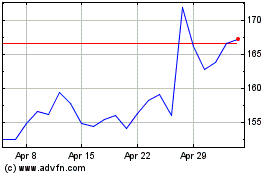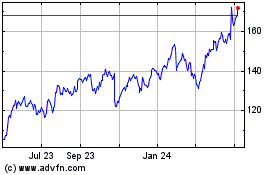By Sarah E. Needleman
A California federal judge heard arguments Monday in a case led
by "Fortnite" maker Epic Games Inc. that legal analysts say could
serve as an early test of whether Apple Inc.'s App Store practices
run afoul of antitrust law.
Epic sued Apple and Alphabet Inc.'s Google last month after they
yanked its shooter-survival game from the App Store and Google
Play. The tech giants said Epic broke their rules by adding an
unauthorized payment system to "Fortnite" that skirted their 30%
commission on in-app purchases of digital goods.
The lawsuits are significant because Apple and Google operate
the world's two largest app stores, which are critical gateways for
how consumers access everything from entertainment to education and
help drive billions of dollars in annual economic activity.
Epic claims that Apple's App Store commission is excessive, that
Apple unfairly prohibits developers from processing customer
transactions themselves and that the tech giant abuses its control
of the marketplace to stifle competition. Epic's lawsuit says the
tech giant's practices violate the Sherman Antitrust Act of 1890, a
law that bars monopolistic conduct.
Apple disputes Epic's characterizations, saying that the
developer can distribute its software through multiple channels and
that charging a commission isn't illegal and covers expenses such
as maintaining user privacy. Apple has also denied hurting rivals
and said it wants apps that compete with its services to
thrive.
During Monday's hearing, which lasted more than two hours, U.S.
District Judge Yvonne Gonzalez Rogers said the case is
extraordinary and that both sides offered compelling arguments. "I
think this is going to be a fascinating trial," she said, without
indicating how she would rule on Epic's request for Apple to
restore "Fortnite" in the App Store with the developer's own
payment system intact.
"If Epic would just come into compliance, it can free
'Fortnite,'" Apple attorney Theodore Boutrous said during Monday's
hearing, meaning Epic would need to remove its payment system from
the game.
The judge asked whether both parties would be amenable to the
game being returned to the App Store without Epic's payment system
but with the 30% commission being placed in escrow until the
litigation is resolved. Epic lawyer Katherine Forrest panned the
idea while Mr. Boutrous said he would need to check with his client
on the matter.
A trial is slated to take place next year.
Some legal observers say Epic might have difficulty prevailing,
in part, because Epic and Apple don't compete principally in the
same markets. Epic could also struggle to prove it has suffered
irreparable harm from "Fortnite" being taken out of the App Store
because it knowingly broke Apple's rules and could avoid that harm
by complying pending trial.
"Apple has chosen to impose a 30% commission at the app-use
level rather than extracting those revenues from the iPhone
purchase," said Paul Swanson, a Denver-based antitrust lawyer at
Holland & Hart LLP who isn't involved in the lawsuits. "I don't
think antitrust [law] prohibits that choice any more than it would
prohibit a club from imposing whatever cover charge it chooses and
then charging whatever it wants for drinks within the club."
Should a judge rule in Epic's favor after Monday's hearing,
Apple would suffer a "significant blow" and the case would likely
be settled within the next six months, said David Hoppe, a tech and
media attorney at Gamma Law in San Francisco. Such a settlement
would likely result in substantial concessions to Epic, he added.
If instead the judge decides to maintain the status quo through
trial, said Mr. Hoppe, the case could stretch on for years.
Judge Gonzalez Rogers last month allowed Apple to keep
"Fortnite" out of the App Store, for now, but blocked the company
from pulling all of Epic's developer credentials needed to
distribute software on Apple devices.
Hearings have yet to be scheduled in the Google case. Separately
Google said Monday that it tweaked its rules for Google Play to
clarify that developers must use the company's billing system to
process in-app purchases. The system is what enables Google to take
its 30% commission on such transactions. The company said 97% of
apps available in Google Play use its billing system. Google said
97% of apps available in Google Play already use its billing
system, which is what enables Google to collect its 30% commission
on digital transactions.
Google also said the version of its mobile operating system,
Android 12, launching next year would make it easier for users to
install other app stores on their devices. In contrast Apple only
allows users to download apps from the App Store on its mobile
devices.
In the six weeks since Epic filed suit against Apple and Google,
the closely held developer has led a bitter, public campaign
against the app-marketplace operators to rally supporters for its
cause. Epic is among roughly a dozen companies and trade groups
that recently formed a coalition to advocate for changes across app
ecosystems through legal and regulatory means. Apple and Google
have defended their business practices, saying the fees they
collect from developers are in line with other app
marketplaces.
On Monday, Ms. Forrest, Epic's attorney, asserted that her
client's efforts to rally supporters are justified because of
Apple's size. "When you are taking on the biggest company in the
world, and you're taking it on where you know it's going to
retaliate, you don't lie down in the street and die," she said.
Developers have historically been reticent to publicly challenge
app stores' rules at the risk of losing access to users and drawing
the ire of companies with abundant financial resources, such as
Apple.
But the increased importance of app stores has raised the stakes
for developers and generated more scrutiny over how those
marketplaces operate. People own more than 900 million iPhones
world-wide, according to Apple, and the only way to access apps on
them is through the company's store.
Scrutiny on Apple's operations isn't just coming from Epic and
the coalition. Companies such as Microsoft Corp. and Facebook Inc.
have sparred with Apple over its App Store policies. Apple is also
among large U.S. tech companies facing inquiries from Congress and
a range of regulators world-wide over how they operate and the
influence they wield.
The judge's August ruling was a split decision for Epic and
Apple. In a trial, Apple's attempt to terminate all of Epic's
developer credentials could be interpreted by a jury as an act of
punishment, said European competition attorney Damien Geradin.
"Apple may come across as vindictive by trying to crush a company
that dared challenging the App Store rules," he said.
Apple recently demonstrated some willingness to alter its App
Store policies. On Friday it said it is giving some businesses a
reprieve from paying its 30% commission on paid events and
experiences through mobile apps until the end of the year. The
arrangement applies to businesses that want to sell access to such
offerings because the coronavirus pandemic has hampered their
ability to host in-person gatherings.
Write to Sarah E. Needleman at sarah.needleman@wsj.com
(END) Dow Jones Newswires
September 28, 2020 17:10 ET (21:10 GMT)
Copyright (c) 2020 Dow Jones & Company, Inc.
Alphabet (NASDAQ:GOOGL)
Historical Stock Chart
From Mar 2024 to Apr 2024

Alphabet (NASDAQ:GOOGL)
Historical Stock Chart
From Apr 2023 to Apr 2024
